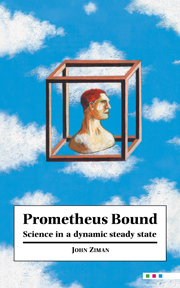Book contents
- Frontmatter
- Contents
- Preface
- 1 What is happening to science?
- 2 Scientific and technological progress
- 3 Sophistication and collectivization
- 4 Transition to a new regime
- 5 Allocation of resources
- 6 Institutional responses to change
- 7 Scientific careers
- 8 Science without frontiers
- 9 Steering through the buzzword blizzard
- Further reading
- Index
1 - What is happening to science?
Published online by Cambridge University Press: 05 August 2012
- Frontmatter
- Contents
- Preface
- 1 What is happening to science?
- 2 Scientific and technological progress
- 3 Sophistication and collectivization
- 4 Transition to a new regime
- 5 Allocation of resources
- 6 Institutional responses to change
- 7 Scientific careers
- 8 Science without frontiers
- 9 Steering through the buzzword blizzard
- Further reading
- Index
Summary
The dark cavern in the mountain rang with the merry hammering of the Dwarves.
The shape of science today
Imagine a space-time traveller, returning after 30 of our earthly years. For Dr Winkel van Rip, it seems only a few months since she hurtled off at nearly the velocity of light in a secret biotest of General Relativity. Now she has come back to her job as lecturer in astrophysics at Loamshire University. Until now she has been a dedicated researcher, entirely uninterested in any aspect of science beyond her textbooks and laboratory bench. What features of contemporary science might catch her innocent eye? What account would she give of scientific life and work in Britain today?
At first, she would be delighted and overwhelmed by all the good science that had been done in her absence. She would enjoy learning about the theoretical explanations of old mysteries, and getting her hands on to marvellously powerful new observational techniques. She would also soon realise that many of the old questions had still not been answered, and that many exciting new questions were emerging. Astrophysics happens to have made conspicuous progress in the last thirty years, but it is not unique. In almost every other field of the natural sciences she would find the same buzz of activity, immense technical achievements, and ever widening challenges and opportunities.
- Type
- Chapter
- Information
- Prometheus Bound , pp. 1 - 16Publisher: Cambridge University PressPrint publication year: 1994



